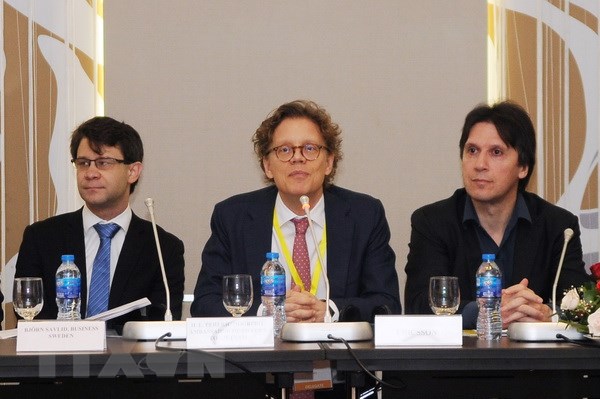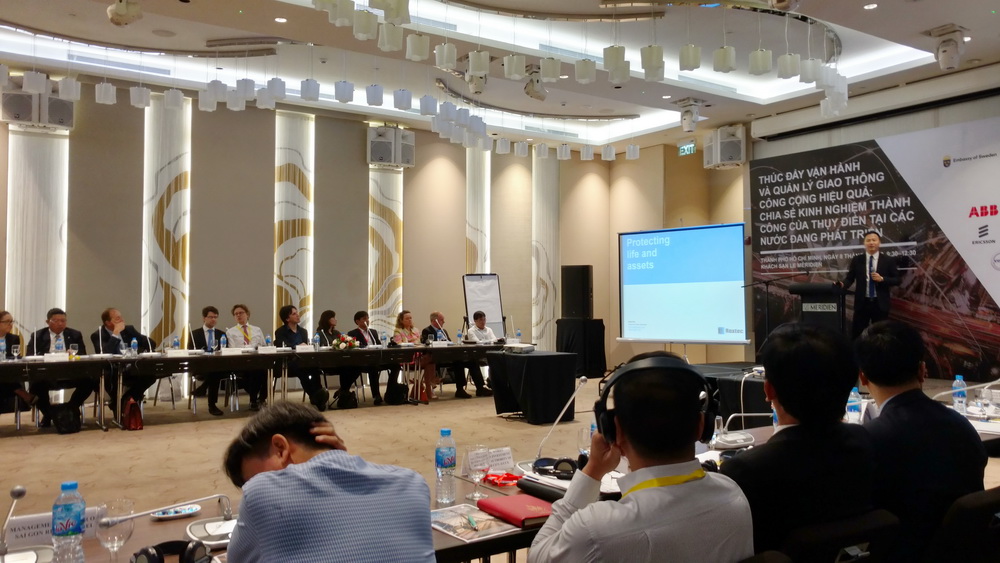Swedish companies that are leading innovators in their respective fields came together for roundtable talks with Vietnamese officials in Hanoi and Ho Chi Minh on Monday and Tuesday to share their experience in improving public transport.
The two-day event, organized by the Embassy of Sweden in Vietnam and Business Sweden, a Swedish trade and investment council, aimed to enhance collaboration between the two countries by promoting best practice and technologies to support the development of the public transport sector.
The discussions were joined by representatives from Swedish companies including ABB, Axis Communications Ericsson, Volvo Buses, Volvo Cars and Roxtec as well as local authorities and firms involved in public transport and urban development.
The delegates discussed at length how Vietnam can increase urban ridership in public transport while protecting the environment, and how the latest technologies can be utilized for improved mobility.
From fast-charging electric vehicles, integrated digital surveillance systems, ultrafast mobile broadband, cable and pipe transit technologies to bus rapid transit (BRT) designs, each of the Swedish companies brought up their own solutions to Vietnam’s traffic problems during the roundtable talks.
“With urbanization and a growing middle class, cities in Vietnam face many challenges, not least when it comes to public transport,” said Pereric Högberg, Swedish Ambassador to Vietnam.
“Swedish innovation and expertise can be of great value when Vietnam is looking for sustainable solutions.”
 |
| Pereric Högberg (C), Swedish Ambassador to Vietnam, speaks during a roundtable talk on public transport in Ho Chi Minh City on May 8, 2018. Photo: Vietnam News Agency |
Vietnam has been going through rapid urbanization as an emerging economy in Asia.
As of 2017, around 40 percent of Vietnam’s population of over 90 million lived in urban areas, according to the General Statistics Office of Vietnam.
City dwellers are forecast to make up half of the country’s population by 2025.
The Vietnamese government is aware of the downside of fast development, and has been keen on pursuing sustainable urbanization, of which public transportation is a key factor.
Vietnam aims to make public transport the people’s preferred choice of mobility by the year 2020 in tandem with tighter restrictions over private vehicles.
Government incentives are expected to bring about the switch to environment-friendly alternative fuels by up to 20 percent of buses and taxis in Vietnam by 2020.
 |
| Tran Quang Lam (C), deputy director of Ho Chi Minh City's Department of Transport, speaks during a roundtable talk on public transport on May 8, 2018. Photo: Vietnam News Agency |
Sweden can be a role model for Vietnam in this respect, having been at the forefront of urban planning, environmental friendliness and traffic safety among the world’s developed countries.
According to the Embassy of Sweden in Vietnam, emission in the European country has been reduced by nine percent since 1990 while its gross domestic product (GDP) has increased by close to 50 percent over the time.
Traffic fatalities were cut by half between 2000 and 2013, down to 30 in a million habitants yearly, among the lowest in the world.
Such achievements were made possible thanks to Sweden’s responsible business conduct, where respecting labor rights, protecting the environment and working against corruption are a legal imperative, according to the Swedish Embassy.
Like us on Facebook or follow us on Twitter to get the latest news about Vietnam!






















































